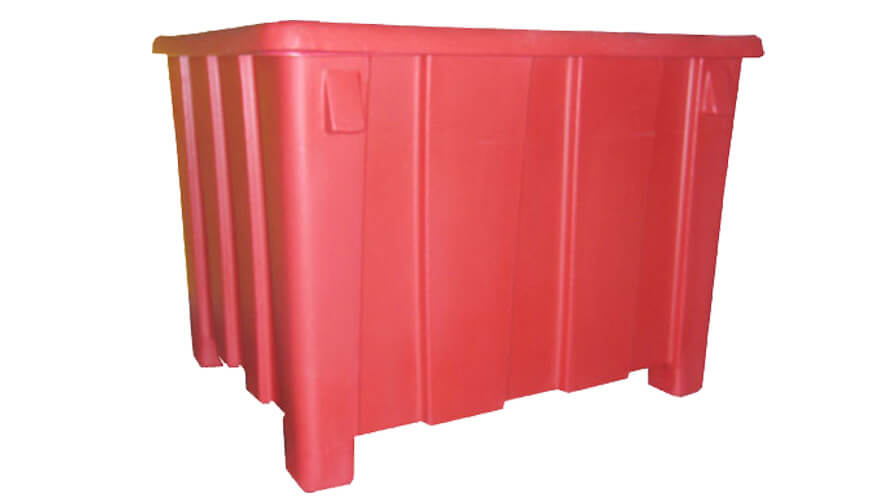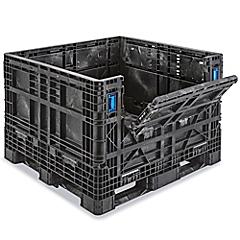How bulk plastic containers for sale can enhance your business operations
Wiki Article
A Comprehensive Overview to the Different Sorts Of Mass Plastic Containers Available Today
Mass plastic containers play an important role in different markets, offering solutions for storage and transport. Their diverse types deal with different demands, from inflexible choices for strong products to flexible containers fitting numerous shapes. Each type offers distinct advantages, making it important to comprehend their attributes and applications. As sectors develop, so do the needs for reliable container options. What factors should one take into consideration when picking the appropriate bulk container?Review of Bulk Plastic Containers

Sorts Of Mass Plastic Containers
Mass plastic containers been available in numerous kinds, each matched to particular applications. Rigid mass containers, flexible mass containers, and intermediate bulk containers represent the main categories, each offering one-of-a-kind benefits. Recognizing these kinds is necessary for choosing the right container for carrying and keeping materials.
Stiff Mass Containers
Stiff bulk containers are vital for effective storage space and transportation of different materials across industries. These containers are usually created from resilient plastics, allowing them to withstand rough handling and ecological problems. They can be found in various shapes and sizes, including totes, drums, and bins, making them ideal for saving every little thing from granular substances to liquids. Stiff containers often feature enhanced walls and secure covers, ensuring the components continue to be protected during transportation. Their stackable design makes the most of storage area, making them excellent for stockrooms and manufacturing facilities. Additionally, many rigid mass containers are recyclable and recyclable, adding to sustainability efforts. On the whole, their robustness and adaptability make stiff bulk containers an essential part in supply chain operations.Adaptable Bulk Containers
Flexible mass containers, usually referred to as versatile intermediate bulk containers (FIBCs), act as a flexible option for transferring and keeping a variety of dry products. These containers are generally made from woven polypropylene and are designed to be light-weight yet strong, enabling efficient handling and stacking. Their versatility allows them to accommodate numerous shapes and dimensions, making them ideal for items varying from grains to chemicals. FIBCs can be furnished with functions such as spouts for simple filling and discharge, in addition to safety coverings for improved sturdiness. Furthermore, they are recyclable and recyclable, contributing to lasting methods in industries such as farming, food processing, and construction. Generally, versatile mass containers supply a cost-effective and efficient option for bulk product monitoring.Intermediate Mass Containers
Intermediate bulk containers (IBCs) are important for the effective transport and storage of fluids and granular products across different sectors. These containers typically have a capacity ranging from 275 to 330 gallons and are developed for very easy piling and managing. Made from long lasting materials like high-density polyethylene or steel, IBCs give exceptional security versus contamination and environmental elements. Their design consists of features such as a built-in pallet for forklift access and a removable top for simple dental filling and cleansing. IBCs are extensively made use of in chemical, food, and pharmaceutical markets, making certain conformity with safety and security policies. Their flexibility and reusability make them a cost-effective option for bulk storage and transportation, adding to supply chain effectiveness and sustainability.Features and Benefits of Bulk Plastic Containers
Mass plastic containers are necessary tools in numerous industries, offering a mix of longevity and usefulness. These containers are created from top notch products, making them resistant to impacts, chemicals, and ecological elements. This robustness guarantees item security throughout storage and transport.Additionally, mass plastic containers are lightweight, promoting simplicity of reducing and managing shipping expenses. Their stackable design takes full advantage of storage space efficiency, enabling optimized stockroom area. Numerous models feature secure lids or closures, giving a closed seal that protects materials and prevents contamination.
Bulk plastic containers are usually reusable and recyclable, contributing to sustainable techniques. Their convenience allows for a large range of applications, from food storage space to commercial use, improving their worth across sectors. Companies benefit from the lengthy lifespan and low maintenance needs of these containers, making them a cost-effective remedy for both long-lasting and short-term demands.
Industries That Use Bulk Plastic Containers
Numerous markets take advantage of the use of bulk plastic containers, each leveraging their one-of-a-kind residential properties for details applications. The food and beverage industry depends on these containers for safe storage space and transportation of items, while the chemical production market utilizes them for handling unsafe materials. In addition, the pharmaceutical circulation requires stress the importance of toughness and cleanliness in product packaging options.Food and Drink Market
As the demand for secure and effective storage remedies proceeds to rise, the food and beverage industry increasingly relies upon mass plastic containers for their operational requirements. These containers offer durable, light-weight, and flexible choices for keeping ingredients, ended up products, and waste materials. Made from food-grade products, they assure conformity with health and wellness and safety and security standards. Numerous styles, such as stackable bins and carry boxes, enhance area throughout transportation and storage, improving logistical efficiency. Furthermore, the openness of some mass containers enables simple inventory administration, reducing the threat of wasting. With the industry's focus on sustainability, lots of makers are now providing reusable and recyclable options, lining up with green practices while satisfying the high demands of food safety and security and health.
Chemical Production Industry
The chemical production industry counts heavily on mass plastic containers for the risk-free and efficient storage space of basic materials, intermediates, and ended up items. These containers are created to hold up against different chemicals, ensuring that harmful materials do not leakage or deteriorate the container itself. Typical kinds include high-density Resources polyethylene (HDPE) and polypropylene containers, which use outstanding chemical resistance and durability. Their lightweight nature and stackable layout facilitate transportation and storage, enhancing area in making facilities. Additionally, several bulk plastic containers feature attributes such as tamper-evident seals and easy-to-read labeling, enhancing security and compliance with market laws. In general, bulk plastic containers are indispensable to the chemical manufacturing process, supplying trusted services for handling diverse substances.Pharmaceutical Distribution Requirements
Drug circulation counts on bulk plastic containers to satisfy rigorous safety and security and regulatory requirements. These containers are necessary for keeping a range and transporting of pharmaceutical products, consisting of active pharmaceutical components (APIs) and ended up medications. Their style warranties security versus contamination, light, and dampness, keeping the stability of delicate products. Furthermore, bulk plastic containers are compliant with industry standards such as Excellent Manufacturing Practices (GMP) and are frequently made from materials that are FDA-approved. The usage of these containers boosts performance in the supply chain, enabling for safe, massive circulation while decreasing waste. Business in the pharmaceutical field focus on using long lasting, watertight, and tamper-evident containers to assure product safety and security and top quality throughout the logistics procedure.Considerations for Choosing the Right Container
When selecting the appropriate mass plastic container, various aspects should be very carefully evaluated to ensure perfect capability and safety and security. The nature of the products to be stored is critical; compatibility with the container's material can affect integrity and safety. Bulk Plastic Containers. Additionally, the container's shapes and size should straighten with the storage space and transportation needs, assuring reliable space useLoad capability is another essential consideration, as it needs to accommodate the weight of contents without risk of damage or failure. The design features, such as venting or lids, can influence functionality and gain access to. Conformity with sector laws is essential, particularly in fields like drugs, where safety and security standards are rigid.
Ultimately, the expected life expectancy and sturdiness of the container must be analyzed to verify it fulfills the functional demands without regular substitute. By reviewing these aspects, one can select one of the most appropriate mass plastic container for particular applications.
Environmental Influence and Sustainability
As services increasingly prioritize sustainability, the ecological effect of mass plastic containers has actually come under examination. These containers, often made from materials such as polyethylene or polypropylene, contribute significantly to plastic waste if not managed effectively. Their production entails the consumption of fossil gas, which can bring about enhanced greenhouse gas exhausts. Nonetheless, innovations in reusing technology and the development of eco-friendly choices are assisting to reduce these issues.Numerous producers are embracing methods that stress the usage of recycled materials, thus reducing the demand for virgin plastics. The durability of mass plastic containers additionally plays a duty; they are designed to be recycled several times, which can minimize their overall ecological footprint when compared to single-use choices. Ultimately, the industry encounters the difficulty of balancing capability with ecological obligation, making sustainable practices vital for the future of bulk plastic containers.
Ideal Practices for Storage Space and Transportation
Efficient storage and transportation of mass plastic containers considerably influence both operational performance and sustainability. To take full advantage of room, organizations need to stack containers safely, guaranteeing stability and preventing damages. Correct labeling is essential for easy identification, which streamlines retrieval procedures. Furthermore, maintaining a clean and well organized storage space area minimizes the threat of contamination and enhances security.For transportation, picking the right automobile is vital; containers must be secured to avoid shifting throughout transportation. Firms must also take into consideration using pallets to promote much easier loading and discharging. Regular evaluations of containers for damage can avoid expensive substitutes.
Temperature control is one more crucial aspect, as severe conditions can endanger the honesty of the plastic. Training employees on finest practices for dealing with and transportation assurances compliance and promotes a society of security. By implementing these best methods, organizations can enhance their functional efficiency while adding to environmental sustainability.
Often Asked Concerns
How Do I Clean Mass Plastic Containers Effectively?
To tidy mass plastic containers effectively, one need to rinse them with cozy water, use a moderate cleaning agent and scrub with a soft brush. Rinse completely, then enable to air completely dry totally prior to storage or reuse.What Is the Life-span of Mass Plastic Containers?
The lifespan of mass plastic containers commonly ranges from 5 to one decade, depending on the material, use, and ecological conditions. Proper maintenance and storage space can substantially extend their use and toughness over time.Can Mass Plastic Containers Be Personalized?

Do Mass Plastic Containers Have Guarantee Options?

Exist Regulations for Making Use Of Bulk Plastic Containers?
Yes, laws exist for using mass plastic containers, mainly focused on safety and security, ecological effect, here are the findings and material conformity. These laws ensure that containers satisfy industry requirements and are appropriate for moving numerous compounds safely and efficiently.Inflexible mass containers, versatile bulk containers, and intermediate bulk containers represent the key classifications, each offering distinct benefits. Versatile bulk containers, usually referred to as versatile intermediate Click Here bulk containers (FIBCs), serve as a versatile option for delivering and keeping a variety of dry products. The chemical manufacturing industry counts greatly on mass plastic containers for the risk-free and reliable storage of raw products, intermediates, and finished items. Bulk Plastic Containers. These containers are made to endure numerous chemicals, guaranteeing that harmful materials do not leakage or weaken the container itself. Furthermore, bulk plastic containers are compliant with sector criteria such as Excellent Production Practices (GMP) and are typically made from materials that are FDA-approved
Report this wiki page